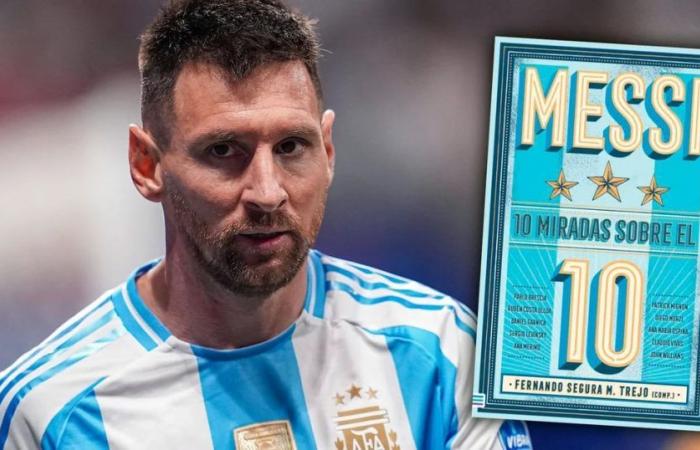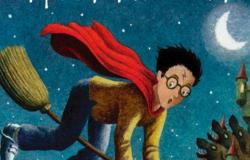Lionel Messi is the central axis of the recent book Messi: 10 views on the 10, a volume that analyzes the career of the prominent Argentine soccer player through the eyes of different authors. The work, published by the publisher Trendsbrings together the observations of ten influential figures in the fields of sport and literature.
The book presents a journey from the beginning of Messi in rosary beadshis hometown, going through his time in FC Barcelonahis passage through PSGuntil his consecration in the World Cup in Qatar. This approach provides a multidimensional view on the career of Messi and its impact both in the sporting and symbolic spheres.
Among the authors are Fernando Williams, John Vivas and Claudio Garnicawho explore different aspects of the life of Messi. For example, Ruben Costa and Diego Murzi address the influence of Messi at a social and cultural level, while Sergio Levinsky and Paul Brescia They analyze his figure from a literary and media perspective.

Infobae Cultura shares a fragment of “The megastar who achieved a countercultural change in the Argentine national team,” the piece of Sergio Levinsky in that book.
Few might be interested that on August 17, 2005, the Argentine team beat its Hungarian counterpart 2-1 in a friendly match in Budapest with goals from Maximiliano Rodríguez and Gabriel Heinze. It sounds like that kind of commitments that become blurred over time, to the extent that official powers of greater importance overlap. However, there was a fact, contained in an event, that could have marked Argentine football in the 21st century, and that today can be told as a curious anecdote. And, for that to have happened, none other than Lionel Messi contributed with his character and his irrepressible decision.
In an attempt to give him space in the Argentine senior team, José Néstor Pekerman was very dedicated to observing the performance of the youth players, with whom he had won three U-20 World Cups, in 1995 in Qatar, in 1997 in Malaysia and in 2001 in Argentina, but which just over a year before the 2006 World Cup in Germany had taken on the responsibility of replacing Marcelo Bielsa – who argued that he had run out of “energy” after just over six years and with the classification on track – decided to give Messi a chance after his superb performance in Holland. In the U-20 World Cup that year, which had ended a month and a half earlier, exactly on July 2, the international promise of the National Team won the title of world champion with the team and the player of the tournament award.

And not only this. Before the final against Obi Mikel’s Nigeria in Utrecht, the contract renewal was signed with the Barcelona Football Club, whose leaders came to ensure that the young star signed with a termination clause that at the age of eighteen was equal to that of a consecrated teammate like the Brazilian Ronaldinho, in no less than one hundred and eighty million euros. Beyond the fact that his coach in that U-20 World Cup, Francisco “Pancho” Ferraro, had decided not to start him in the debut in the group stage against the United States – nor did Gustavo Oberman himself, when he saw himself on the board as a member of the initial team he was able to avoid the surprise—and that after winning the title he stated in the press conference after the final that if he had to highlight a player from the squad he would turn to the then midfielder Pablo Zabaleta, issues with which The Barcelona star would have to deal culturally for many years, it was evident that the eyes of many fans and the magnifying glass of much of the journalism were focused on Messi.
He was a young man who had not been seen in national competitions because he had emigrated to Catalonia when he was only twelve years old. Still, yes Messi He was able to complete a brilliant journey in Holland that deserved a phone call and the first contact with the great Argentine idol, Diego Maradona, was largely because after the defeat in the debut against the United States Ferraro had received another call, but much less flattering. It was the president of the AFA, Julio Grondona, to give him an ultimatum: either the Barcelona boy played in the U-20 World Cup or the coach returned to Argentina.
With the expectation of seeing him in action, although in a match without specific significance, Messi then entered against Hungary from the substitute bench eighteen minutes into the second half, with the number 18 on his back to replace the scorer Lisandro López. Just over thirty seconds had passed when he received the ball, he wanted to face his marker, Vilmos Vanczák, who crudely pulled on his shirt. The young Argentine shook him off with a slap that grazed his face. The home defender held his face. The German referee, Markus Merck, was carried away by this image and proceeded to directly expel the Argentine.

Only forty-five seconds had passed since he came on, with all the excitement that could be felt not only by him but by so many fans who thought they were in the presence of a different player, who came to bring light in difficult times, with meager results for the Albiceleste. In the midst of so much disappointment, over the years, Messi confessed that, after what happened, he thought that the coach would never call him up to join the national team again. The curious thing is that in the images of the situation you can see that one of the teammates who argued most vigorously with the referee Merck was a certain Lionel Scaloni. Years later they met again in a different context and with an infinitely better outcome.
The story of Lionel Messi in the Argentine national team is, in retrospect, one of the triumph of talent, will, perseverance, and resilience to overcome not only all kinds of criticism, many of them based on prejudice. For example, “walking out” of games when they seemed unfavorable, not being interested in his country because he lived abroad, preferring money over the shirt, always wanting to impose his will because he supposedly had absolute “power” when he was already a consecrated star, and, of course, there were conditions when the comparison with Diego Armando Maradona arose, to whom some press went so far as to pretend to ask his permission to praise him, so that he would not feel that someone had appeared who could compare to him.

[Más sobre Messi y los otros campeones del mundo se puede leer gratis clickeando acá.]
It is, after all, the story of a countercultural winner because he achieved his greatest consensus when he seemed most depressed by the lack of results, for having reached the top without having even spent a season in soccer in his country, for having been contrasted, in his game and even in his life, with a demigod, and because he ended up being supported by a young generation in a country in which experience weighs when it comes to the impositions and decisions of the system.
The truth is that this little boy with straight hair, with very few words and a look towards the ground, of whom many Argentine journalists did not even know his full name and wanted to start a dialogue in Budapest to get to know him a little better, was growing so much in his club. , in Barcelona, who had won the title by beating the Frenchman Ludovic Giuly without breaking a sweat. His performance had been fundamental, with his talent and his speed, for his team to reach the final and win their second European Champions League at the end of that 2005-2006 season with the Dutchman Frank Rikjaard as coach. This, despite a very serious injury at Stamford Bridge against José Mourinho’s Chelsea in the round of 16 that caused him to leave crying uncontrollably and miss the final in Paris against Arsenal.






